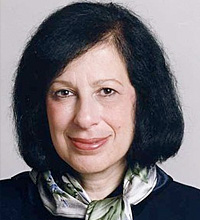Adapting in Times of Stress: Ideas for women in family enterprise – and their financial advisors
For many women in family enterprises adapting to new situations such as marriage, partnership, motherhood, widowhood, divorce, loss of a loved one, moving, or job transition can be stressful, and, as we know, stress can manifest itself in a variety of ways.
One such manifestation may be a lack of confidence in dealing with financial matters as these women face new decisions and adapt to their “new normal” after confronting a stressful situation, particularly the death of their husband or partner.
Financial advisors, however, can often teach women to be aware of their financial selves and consider their current stressful situation when making decisions. When women can be open about their needs and desires with professionals as well as with family members, they can develop skills that will enable them to be savvy consumers of financial services.
Gayle Buff, a former psychiatric nurse trained in nutrition as well as a CFP® and a CFA, says: “Generally…women tend to be more cautious than men. However, this is not always the case. Men tend to be more over confident in their abilities to discern [stock] market patterns, where often none exist.”
Women are very adaptable. Buff notes that women have a thinner corpus callosum, which divides the brain’s hemispheres, providing easier access to each hemisphere. That is why women seem to switch quickly from one interest to another. Yet women can be less confident than men in their decision-making.
Ideas on how to proceed as an advisor:
- In the aftermath of the loss of a spouse, partner or other family member, a woman may either be very cautious or take surprising risks and she may exhibit caution and risk at different times. A family business advisor should, therefore, ask open-ended questions:
- Do you intend to sell your home? Why?
- Where are you planning to live? How did you choose that location?
- Do you plan to continue working (or return to work)?
These kinds of questions will help the advisor learn whether there is a thought-out plan, or an urge to escape the past. As an example, one woman I worked with immediately sold her country home when her husband died there. She regretted that hasty decision for the next decade.
- An advisor should be open and adapt to the woman’s pace. The grieving process is uneven. People encounter various types of grieving in unpredictable stages. A widow may be mourning the loss of her spouse, a way of life, and the control and status marriage to a family enterprise leader brings. Financial advisors should be wary of moving too quickly before a widow is ready to adapt. Bereavement counselors used to deal with specific stages of grief. Now there is a saying among counselors, “Meet them [bereaved people] where they are.”
- Let your women clients tell you their concerns. Clients look to advisors for guidance and support for their decisions. Allowing the information to come from the client shows a readiness to listen and consider alternatives. If you are not interested in their concerns, women are quick to pick up on your lack of attention and respect, and slow to forget interaction that is not about their concerns.
- Slow down — consider a smaller change. Sometimes single change seems more do-able. Presenting too many options can be confusing and difficult for the client to understand.
- Offer bite-sized pieces. Many people don’t take action because it’s easier not to change. Advisors can guide women who are at a point of change through steps that are important to accomplish their goals, lessening the anxiety by customizing a list for their needs and level of readiness. Let them absorb the steps it will take to adapt. Talk with them about the processes that can help.
- Present “proof” of the ease of change. Sometimes charts and diagrams can be introduced to clarify the concepts involved in evaluating the costs of change.
- Involve your client in the process. Think in terms of a working partnership instead of a lecture or list of your ideas.
- Turn the issues into your clients’ words. Repeat phrases your clients use about their concerns. Recently a new client told me she had “broken up” with her last advisor. There is a clue in these words about how she leaned on that advisor and the emotional impact of making the change.
- Be prepared to repeat and explain your advice again. Do a reality check on your own processes. Be patient. If you are making progress, that should be enough. Remember to meet your client where she is.
- Don’t show how much you know by presenting too much information at once. You will be more valuable walking women through the process as they complete each part. And you will have a happier client. That may be a mark of a true expert.
And finally… consider the following Widow’s Checklist of Adaptability.
Until a new widow has found her bearings she should not:
- Take advice from people she does not respect.
- Take permanent actions out of fear or uncertainty.
- Take permanent actions without checking with her professional team.
- Move to a new location before trying it out as a renter first.
- Sell the family home before factoring in the annual costs of living in it versus the costs associated with a new residence.
- Change advisors before getting full information on costs, performance, and services from her current professionals.
- Change her portfolio before investigating the performance and the style over a number of years.
- Change her will without proper thought and advice.
- Make decisions that cannot be changed.
- Sell or restructure the family’s businesses or consider entering new partnerships until her mind is clear.
Summary
We who work with family businesses are often called about issues of change. Use your professionalism, training, and judgment to meet your women clients where they are and set a suitable pace for them. Use stories in your explanations as much as figures. Be patient, take the lead from your client’s readiness to adapt, and look forward to a long-term relationship.
About the contributor:
 Karen Caplan Altfest, Ph.D., is a principal advisor and executive vice president of client relations at Altfest Personal Wealth Management™. Named one of the “Top 100 Women Financial Advisors” in the United States in 2014 by The Financial Times, Karen is a frequent speaker on the subject of women and money and conducts educational seminars for recent widows and people looking to retire. She can be reached at KAltfest@altfest.com.
Karen Caplan Altfest, Ph.D., is a principal advisor and executive vice president of client relations at Altfest Personal Wealth Management™. Named one of the “Top 100 Women Financial Advisors” in the United States in 2014 by The Financial Times, Karen is a frequent speaker on the subject of women and money and conducts educational seminars for recent widows and people looking to retire. She can be reached at KAltfest@altfest.com.




